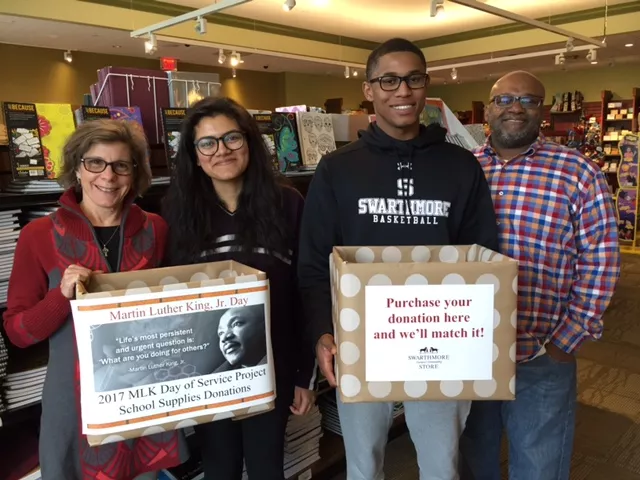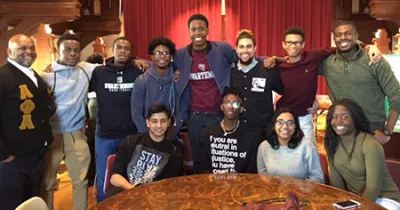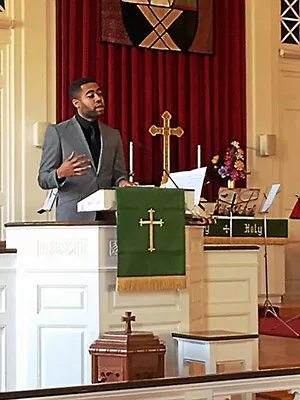College Community Honors Legacy of Rev. Dr. Martin Luther King, Jr.

From left: Joyce Tompkins, Abha Lal ’19, Cameron Wiley ’19, and Dion Lewis collecting school supplies at the Swarthmore Campus & Community Store, which coordinated a matching donation program for all supplies purchased prior to the Day of Service.
“Life’s most persistent and urgent question,” said Rev. Dr. Martin Luther King, Jr. “is what are you doing for others?”
In response to the question and reflection of King’s legacy, Swarthmore is celebrating its annual MLK Commemoration Week. Throughout the week, the College is presenting a rich array of programs for students, faculty, and the greater community centered on service and inclusivity.
“As an educational institution, we have a responsibility to educate not just our students but the whole community,” says co-organizer Joyce Tompkins, director of religious and spiritual life. “This is a way to show that we’re all a part of the same web of learning and of giving back.”
The celebration kicked off Monday with a day of service, which brought approximately 100 volunteers to Upper Tarble to organize bags of school supplies and write personal notes for the children who will receive them. College community members donated supplies throughout the fall semester for the bags that will be delivered to eight tutoring and youth-services sites in nearby Chester, Pa.
“This was an opportunity for people to do something good on King Day,” says Tompkins, “but in a way that will have an ongoing impact."

Students and staff gather in Upper Tarble for the College's annual day of service.
A social justice workshop, “Fighting the Systems: Destabilizing Systemic Oppression,” followed the day of service. Facilitated by the AntiOppression Resource and Training Alliance (AORTA) and co-organized by violence prevention educator and advocate Nina Harris, the workshop sought to cultivate “a shared language and deeper analysis of how system oppression operates so that we can better understand how to transform ourselves, our organizations, workplaces, and communities.”
“It was delving deeper into Dr. King’s message of systematic oppression and what that means in the 21st century and beyond,” says Dion Lewis, dean of the junior class and director of the Black Cultural Center (BCC), who co-organized the week’s events.
The King celebration continues tonight at 7 p.m. at the BCC, at which College community members will gather for a candlelight vigil in remembrance of those who have given their lives to the cause of social justice.
“This is a time to honor those lives,” says Tompkins, “holding up the light of those who illuminate that path for the rest of us to follow.”
On Thursday at 7 p.m. in the Lang Performing Arts Center, actor/director Clark Johnson will present his film Boycott and hold an audience Q&A. The award-winning film tells the story of the 1955-1956 Montgomery Bus Boycott.
Johnson returns to campus on Friday as the featured speaker for a 12:30 p.m. collection at the Friends Meeting House, which includes a performance by the Swarthmore Gospel Choir.
“We will return to our Quaker beginnings with the first collection of the semester,” says Lewis. “We will come together in that tradition, but also use that time to reflect upon Dr. King’s timeless legacy.”
The timing of the collection coinciding with that of the presidential inauguration “feels apropos,” says Lewis, giving the College community “time to reflect on what the politics of this entire election cycle, no matter who you supported, meant for our country and how we move forward.”
In addition to MLK Commemoration Week, three members of the College community publicly paid tribute to King's legacy this week.

Patrick Houston '17 delivers the keynote speech at the Media (Pa.) Fellowship House. Photo from the Delaware County Daily Times
On Sunday, President Valerie Smith gave the annual Martin Luther King, Jr. sermon at the First United Methodist Church of Germantown. Alan Symonette ’76, a labor arbitrator, introduced Smith to his fellow congregants.
Two days earlier, Arto Woodley gave the keynote speech for a reception honoring King at a public library in Bowling Green, Ohio. Woodley, the scholar in residence for engaged scholarship at the Lang Center for Civic & Social Responsibility, discussed tangible approaches for moving forward in race relations.
Also on Sunday, Patrick Houston ’17 spoke at The First United Methodist Church of Media. The special major in political science and environmental policy from Philadelphia, Pa., looked back on “some of the darkest hours of Dr. King’s life and how he was ultimately able to prevail in spite of them,” in the hopes of inspiring the community to take action.
“The legacy of Dr. King does not mean we must give up everything to serve, but the reality of his life implores us to do something,” says Houston. “Exactly how each of us decides to go about this depends on the values we hold dear.”
MLK Commemoration Week is sponsored by the Black Cultural Center, the Office of Religious and Spiritual Life, the Women's Resource Center, the Office of the President, and the Student Budget Committee.



